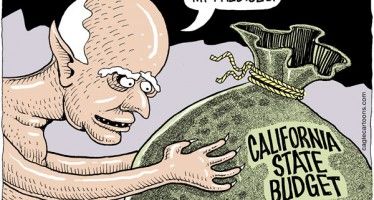Assembly shuns accountability for slush fund
March 1, 2013
By Katy Grimes
California Assembly leaders enjoy an annual slush fund of $38 million. It’s money they can do with however they please.
The Assembly’s operating budget was $112 million for the 2011-12 fiscal year that ended June 30, 2012. But $150 million was appropriated. The remaining $38 million was spent at the discretion of Assembly Speaker John Perez, D-Los Angeles.
It’s like a giant, sugary slushy.
In 2011 and 2012, I reported on the Democratic stonewalling done to then-Assemblyman Anthony Portantino, D-La Canada, when he tried to get Perez to release the entire Assembly budget, including the “discretionary” spending, in a move toward transparency. Portantino was stonewalled and punished.
Task force
I just spoke with Phillip Ung, California Common Cause policy advocate, about this gigantic fund of unaccountable millions, and how this happens every year without intervention, exposure or accountability. Ung said that the Assembly has no oversight other than itself.
Assembly Rule 15.7 requires an annual performance audit in addition to a financial audit. But Assembly leaders have historically ignored this rule.
Perez formed a legislative records task force late in 2011 after the Sacramento Bee and the Los Angeles Times filed a lawsuit demanding the operating records. In a move which can only be described as the fox guarding the henhouse, Perez named Assembly Rules Committee Chairwoman Nancy Skinner, D-Berkeley, as its leader. Assembly operations are controlled by Perez and the committee.
The task force did nothing in 2011 other than release doctored records of Assembly members’ office spending, specifically targeting Portantino.
Early in 2012, Portantino demanded the release of all Assembly records to the public. But Skinner’s committee denied his request, saying the Assembly’s letters and correspondences are exempt from transparency under the law.
As of April 2012, when I wrote my last story about the task force, there were still no records available of any meetings. To date, finding any information about the task force is difficult. I contacted Skinner’s office for a status update of the task force. The two staff members I spoke with said they couldn’t locate any information about the task force, and referred me to Perez’s office.
“The Speaker’s committee on transparency is secret,” Portantino told me in April 2012. “The minutes on the committee…secret. We don’t know if they’ve ever even met. Members should be embracing transparency. It’s not a radical concept.”
The Assembly Rules Committee then killed Portantino’s AB 1887, which would have required the state controller to audit the spending by the Legislature for the next two years. Thereafter, an independent firm would perform the annual audits.
“We celebrate when the auditor audits Bell, CA,” Portantino said. “We are an agency which budgets more than we need for a slush fund.”
AB 1887 also would have required the Legislature to return any of the $146 million not spent. However, without that law, Perez gets to decide where and how the money gets spent.
In 2011, leaders in the Assembly and Senate authorized $200,000 for lawyers to keep the information secret in the fight over records, according to Portantino.
Violating its own rules
One of the Standing Rules of the Assembly calls for an annual performance audit of the Assembly. But in 2011, Trent Hager, Portantino’s chief of staff, told me the Assembly has never actually complied with this rule. And Hager ought to know because he worked for the Rules Committee for many years.
The rule reads:
“Performance Audit — 15.7. In addition to the annual financial audit required by Rule 15.6, the Committee on Rules shall contract for an audit of the administrative operations of the Assembly. The administrative departments to be audited shall be determined by the Committee on Rules. An organization performing an audit pursuant to this rule shall be selected by a majority of the membership of the Committee on Rules. A contract for an audit shall be awarded through a competitive bidding procedure. Audits shall be prepared in a manner and form to be determined by the organization performing the audit, and shall be consistent with generally accepted accounting principles.
“All findings and recommendations reported by an auditing firm shall be made available to Members and to the public.”
One of the reasons for secrecy may be the worst kept secret in the Capitol — the numbers of Capitol staffers on the payroll of the Legislature who actually work on political campaigns, something banned by law.
Where’s the slush?
Ung explained that most of the slush fund money goes to pet issues of the Assembly leaders. Rules governing the slush fund, which is contained in the Assembly operating budget, are “vague and ambiguous,” making it easy for abuse. And Ung said it’s highly questionable to send money from the slush fund to various state agencies without an Assembly vote.
That’s just how the Assembly obtains its surplus, according to a 2011 signed court declaration by Gus Demas, then fiscal officer for the Assembly Rules Committee. The details of the budget on the state website do not include the slush fund. But some expenditures were reported by the Daily News, which got ahold state budget documents:
The California Commission on the Status of Women ($150,000);
The California Conservation Corps ($680,000);
The California Military Department ($800,000);
The California State University system ($400,000);
The Department of Education ($8 million); and
The Department of Parks and Recreation ($1.5 million).
Other recipients were the Secretary of State’s Office and the Joint Legislative Budget Committee.
Assembly leaders have spent more than $73 million of the slush fund since December 2009.
According to Demas’ court declaration, Assembly leaders gave $55 million to state agencies between December 2008 and August 2011. Perez spent another $21 million between December 2011 and Aug. 31, 2012, according to state budget documents.
Related Articles
Hearing uncovered abuse of CA special funds
SACRAMENTO — Only in government is borrowing considered a legitimate way to balance a budget. In California it has become
Municipal Bankruptcy Stalks Stockton
FEB. 27, 2012 By WAYNE LUSVARDI Stockton, California’s 13th largest city, may be moving from “Fat City” to “Mudville.” Both
Inflation Means California Default
APRIL 29, 2011 By WAYNE LUSVARDI A March 24 Los Angeles Times-USC opinion poll indicated that 80 percent of likely




